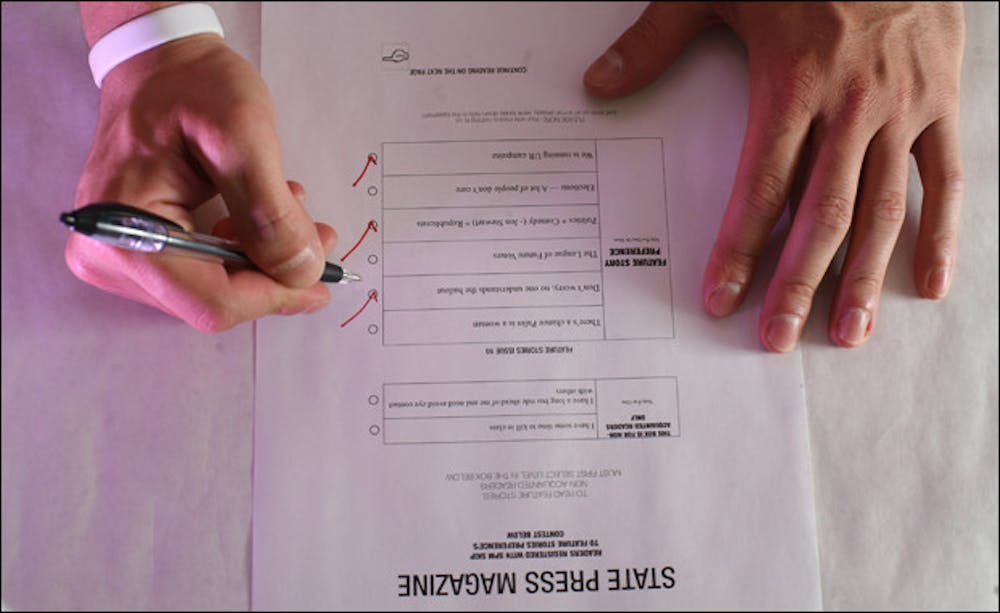Although the 18 to 29-year-old demographic is least likely to vote compared with older counterparts, young people have been voting more in recent general elections, and 2008 is projected to follow the trend.
According to Pew Research polls, young voters today are significantly more likely to give the election more thought than they were four years ago, with 53 percent of registered voters age 18 to 29 saying they have though a lot about this election — up 18 percent.
ASU political science professor Kim Fridkin says among the younger demographic, voter apathy has been down in recent general elections. Voter apathy is a common phenomena generally highest among young voters — it indicates a lack of understanding and a general indifference towards voting. If people have low levels of voter apathy, they’re more likely to turn out to the polls.
“There has been evidence that turnout among young people has been increasing since 2000,” Fridkin says. “However, voter turnout is normally always lower for young people compared with any other group.”
There are a few major reasons that younger people historically have been the least likely group to show up to the polls. One major reason is young people are youthful — they haven’t lived long enough to fully perceive the effect public policy has on them. “Kids’ roots in the community aren’t that deep yet, so they feel they don’t have stake in the election,” she says.
“I know what’s going on for the most part, but sometimes it’s hard to understand how my vote will change anything,” says interdisciplinary studies major Matt Watters. Watters says he was registered to vote in the 2004 general election but didn’t due to feeling like his vote wouldn’t matter and additionally not wanting to drive the distance to his polling location — which raises another major barrier of young voters.
“Most college kids are registered in their home towns, so it’s harder to vote. College kids don’t like the extra hassle,” he says. “It’s harder bureaucratically for young people to vote because of mobility issues,” Fridkin says. She says young voters are more mobilized than settled, older voters and are subject to frequent changes of address — like the move many students make from home to out of state colleges. “A lot of times young people haven’t registered to vote in the state they now live in,” she says.
Fridkin says even though reported moves among young people have gone up in the past two elections, they’ve been ensuring registration more often, wherever they are. An option for out-of-state students registered at home is to request a mail-in ballot or absentee ballot — the deadline for mailing in a ballot in most states is the last days of October.
Late night parties, a generally disheveled lifestyle and moods that swing from passion to indifference don’t explain why young people vote less than mom and dad? Fridkin says it’s a misconception that young people are more apathetic and therefore don’t vote as much as older demographics.
“Young people aren’t any lazier than any other voter age group, they just don’t feel as committed because they haven’t been part of the political landscape as long,” she says.
Mom and dad have been voting for many years — it’s become an ingrained behavior. Researchers found that as a person has more voting experiences, the more likely they are to continue to vote. “Young people just don’t have the habit yet,” Fridkin says.
Some ASU students say they won’t let their age be an excuse for not voting. “It’s hard to believe that 18 to 29-year-olds would be the group that votes the least, what happens in the election is going to be affecting our future directly,” says public relations sophomore Brent Amy.
Fridkin says young people need to realize their votes are vital to having a voice in American policy. “Young voters aren’t the mirror of older voters, therefore they have distinct preferences of their own.” College-age voters, for example, may be more apt to vote for a candidate that discusses ways to lower student loans in their platform whereas older voters may have different inclinations. “Young people have different views, if they don’t vote they won’t have a say.”
“I don’t think America will see the changes it needs if young people don’t vote,” says journalism junior Abby Gilmore. “If you’re not going to vote in this election, what makes you think you’re going to in four years?” she says. “If you don’t vote, you shouldn’t complain. Your voice is in your vote.”
Reach the reporter at michelle.masek@asu.edu.




